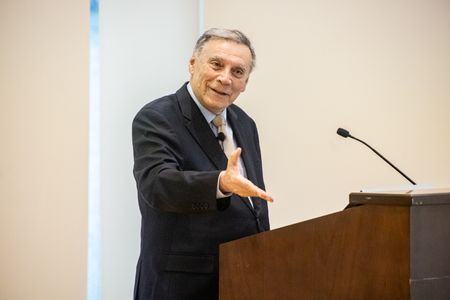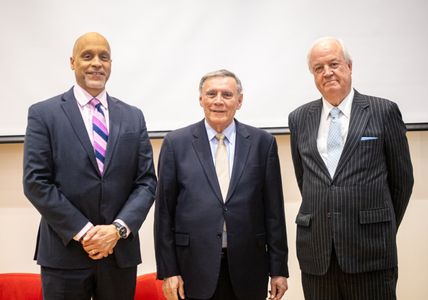Jamil Mahuad, Former President of Ecuador, Delivers the 2025 Janetos Lecture
On April 8, 2025, Frederick S. Pardee School of Global Studies welcomed Jamil Mahuad, former president of Ecuador (1998–2000) to deliver the 2025 Anthony C. Janetos Memorial Distinguished Lecture titled “Trump 2.0 and Latin America.” Hosted by the Pardee Center for the Study of the Longer-Range Future, the address explored Trump’s return to presidency and its effects on the U.S.-Latin American relations.

Ambassador Jorge Heine, Research Professor at Boston University’s Frederick S. Pardee School of Global Studies and Interim Director of the Frederick S. Pardee Center for the Study of the Longer-Range Future, introduced President Mahuad. Heine underscored his professional achievements including his Nobel Peace Prize nomination for the Ecuador-Peru Peace Treaty that, as President Clinton noted, “resolved the Hemisphere’s last and oldest source of armed international conflict.”
In the initial parts of the lecture, Mr. Mahuad discussed a wave of demonstrations unfolding in Latin American countries including Brazil and Chile, demanding profound political and social transformations, in the decade before the pandemic. The former president further explained:
“They [protestors] want solutions to objective problems, jobs, better salaries, the possibility to have a future, but at the same time, they want solutions to subjective problems. It’s about, again, identities, about values they want. Many times you can hear economists speaking about the problems and everything is containing numbers. You can talk about GDP, GDP per capita, Gini coefficient, etc. And those are very good numbers to understand a lot of things but not all of them.”
He articulated a spectrum of factors including poverty, illegitimate political representation, corruption, and unacceptable perceptions of unfairness that culminated into mass protests in these countries.

President Mahuad, in his address, highlighted Donald Trump’s recent victory by popular vote, congressional majority, and strong network of allies, remarking that these factors have made him one of the most powerful presidents in the American history. The Harvard professor also noted that Trump in his second term “came with a very clear idea of what he wanted to accomplish,” asserting the contrast between the Trump 1.0 and Trump 2.0.
To emphasize shifts in the foreign policy landscape, Mr. Mahuad presented a side-by-side comparison of global trade maps from 2000 and 2024, which illustrated America’s former lead and China’s current dominance.
In closing, President Mahuad urged the U.S. government to recalibrate its foreign policy toward Latin America, by offering pragmatic recommendations.
“First we would like to have clear rules of the game. Please American governments have one foreign policy for Latin America to decide and try to maintain it. Second, if we decide one course of action, let’s keep it, let’s respect it. And Latin America cannot accept to choose from China or the United States. This is completely impossible. We have very good relationships, commercial relationships with both of them.”
In the Q&A section, President Mahuad answered various questions related to the need for a new democracy in Latin America, Ecuador’s experience with dollarization, the current administration’s attitudes regarding taking control of Panama Canal and its effect on diplomatic relations, prevalence of extortionist entities in Peru, and federalized banking in Ecuador.
To view the full lecture, click here.
Jamil Mahuad is a Senior Fellow at the Program on Negotiation Harvard Law School and teaches as Executive Education Faculty on Leadership and Negotiation at Harvard Kennedy School. He has been Co-Director of the Project on the Prevention of Global Violence, part of the Harvard Institute on Global Health (HIGH), under the office of the President of Harvard University (2009-2011); Co-founder and Senior Adviser of the Harvard International Negotiation Program at Harvard Law School (2004-present); Board Member of The Abraham Path Initiative; and Global Advisory Council Member of Mediators Beyond Borders. In 1999, he was honored with the WWF’s Gift to the Earth Award.
The annual Distinguished Lecture is named after Prof. Anthony C. Janetos, who served as the Center’s Director from 2013 until his death in 2019. This event by the Frederick S. Pardee Center for the Study of the Longer-Range Future memorializes his dedication to public scholarship of interdisciplinary research on critical international challenges, intending to advance the long-term improvement efforts in the human condition.
The Frederick S. Pardee Center for the Study of the Longer-Range Future is an interdisciplinary research center of the Frederick S. Pardee School of Global Studies at Boston University. The Center conducts interdisciplinary research on globally important issues that affect the human condition over the course of several decades. Through programs of scholarship, outreach, and education, the Pardee Center works to improve public decision-making and policy and to train future generations of interdisciplinary scholars.